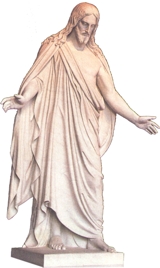Bluntly put, Mormons do not play by the rules of the Nicene Creed. Their theological arguments can look like a form of cheating when, in reality, they are trying to change the way the game is played. Mormonism is like an alternative reality come to life—a counterfactual history of post-Nicene developments of pre-Nicene theology, the ultimate “what if” theological parlor game. What if Tertullian had been more successful in his explication of the materiality of the soul? What if the monks of Egypt had won their battle in defense of anthropomorphism? What if Augustine had not read the books of the Platonists? Mormonism invites creedal Christians into a world where everything is slightly but significantly skewed from what they are used to. It is as if you are hearing stories you had never heard before about someone you love and thought you knew perfectly well. Better put, it is as if you had discovered another branch of your family that you did not know existed.
[…]
Mormons put the Platonization of Christianity at the heart of their critique of the ossification and corruption of Christianity. Something went terribly wrong after the age of the Apostles, they argue, and that something has to do with the theological turn toward a metaphysics of immaterialism. Far from ignoring early church history, then, Mormons are committed to an interrogation of the relationship of theology to philosophy that objects to nearly every development that led to the ecumenical creeds. They do not just raise objections, however. It is as if, as they follow the road orthodox theologians took to the creeds, Mormons pause to pick up the detritus that was jettisoned along the way. They then recycle these discarded beliefs into a shining, novel creation of their own.
Stephen H. Webb, Jesus Christ, Eternal God: Heavenly Flesh and the Metaphysics of Matter (New York: Oxford University Press, 2012), pp. 244, 245
I can’t say how accurate Webb’s evaluation of Mormonism is. I suspect it’s more generous than many would allow, and I can’t help but recall how influenced I am in my assessment of new religious movements such as Mormonism by Christian apologetic works. However, it strikes me that, if all truth is God’s truth, there is no reason why Mormonism shouldn’t contribute to dialogue about Christology if it has something sensible to say. The trouble is, as Webb acknowledges, mainstream Christianity will probably dismiss Mormon Christology as anything but sensible, mainly because its metaphysical presuppositions fly in the face of Nicene Orthodoxy. But certain Mormon views on Jesus are held or intimated by a number of mainstream or orthodox theologians. According to Webb, Mormon Christology claims that (a) Jesus is eternally embodied and so never logos asarkos; that (b) Jesus and human beings share in the eternal substance of divinity, though in different ways; and that (c) that the stuff of divinity is not simple, and so each member of the Trinity is relatively independent. And, also according to Webb, at least views (a) and (c) are held or echoed by Karl Barth and the so-called Social Trinitarians respectively, and (b) could be a version of the traditional doctrine that Christ became what we are so that we might become what he is.
Do we need to take Mormonism more seriously as a dialogue partner, as Webb suggests, even if we can’t or won’t accept Mormon teachings wholesale?

No comments:
Post a Comment
Note: only a member of this blog may post a comment.